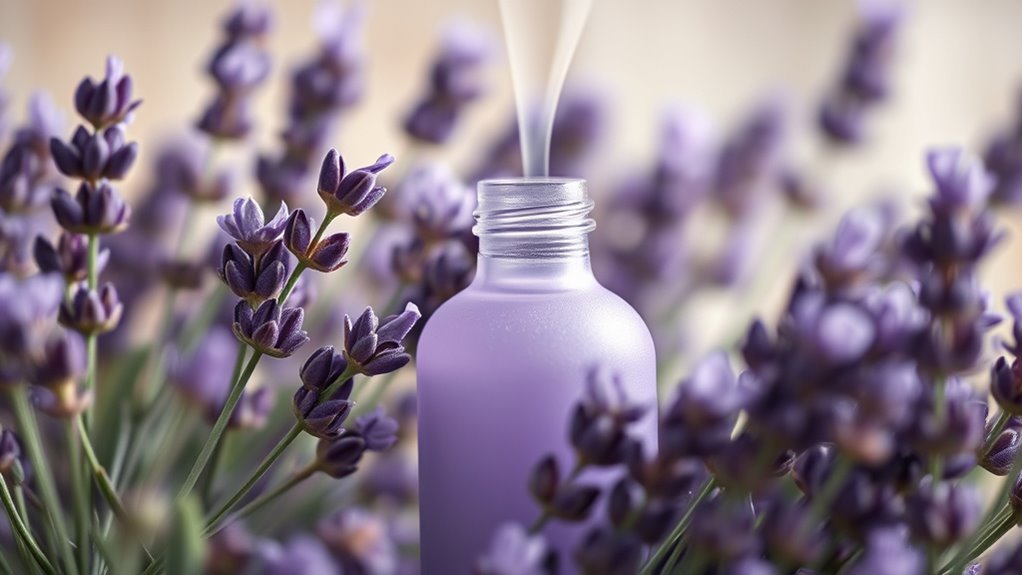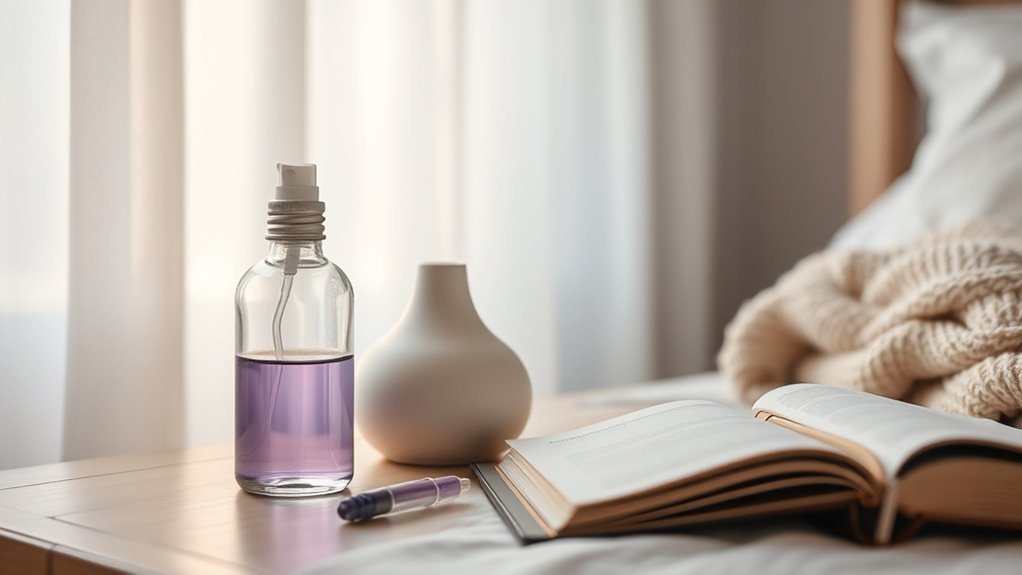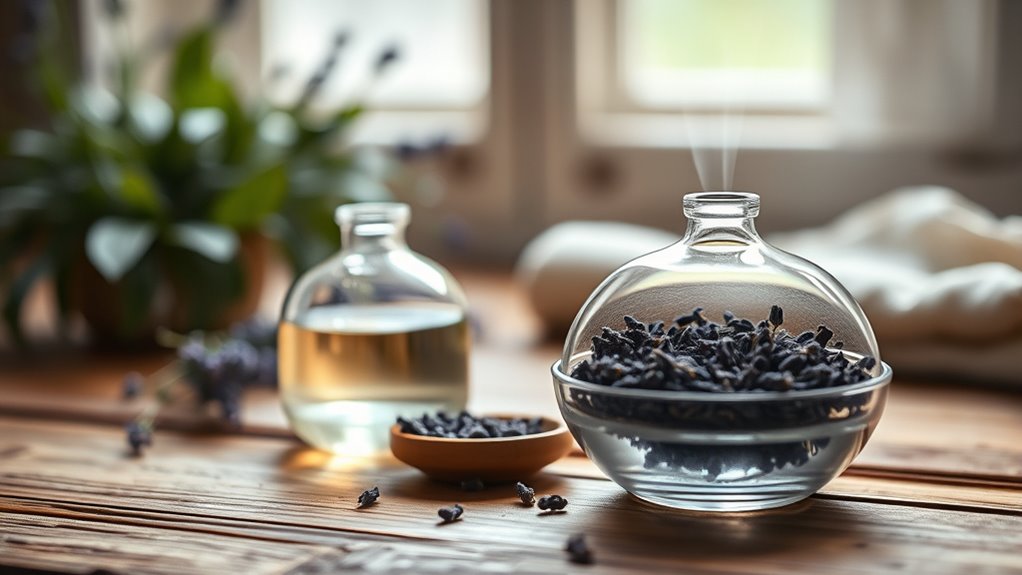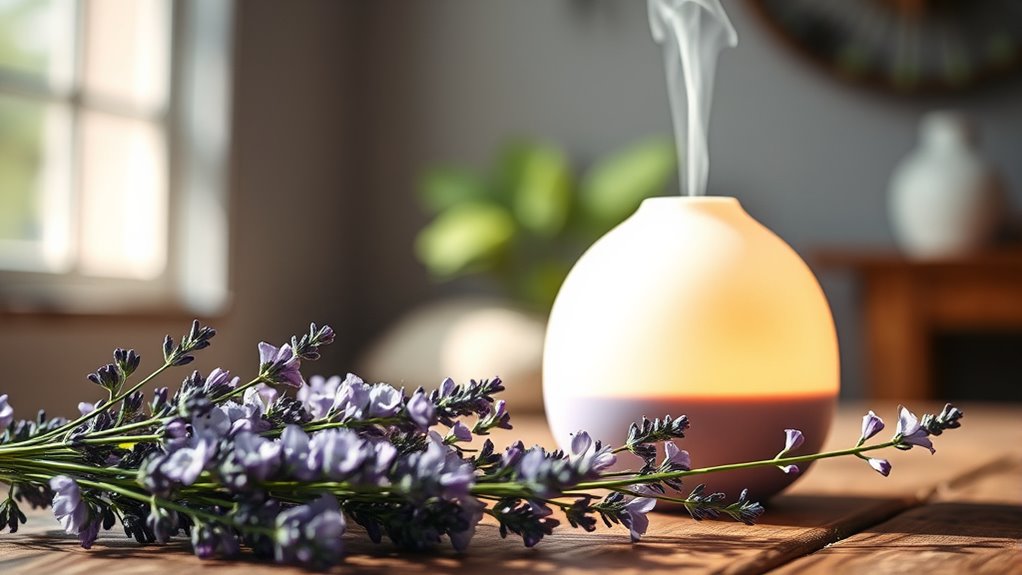Using scent cues like lavender can naturally promote relaxation, reduce stress, and ease anxiety by activating your limbic system. You can diffuse lavender essential oil before sleep or during stressful tasks to create a calming environment and reinforce positive habits. Citrus scents like lemon or orange boost alertness and focus, encouraging energy and productivity. Incorporating these aromas into your routines helps subconscious triggers support your goals—continue exploring how to harness scent cues for behavior change.
Key Takeaways
- Use lavender diffusers or sprays in routines to signal relaxation and reduce stress, promoting calm behaviors.
- Associate lavender scents with specific tasks or goals to reinforce positive habits through repeated exposure.
- Place lavender-scented objects in key areas to subconsciously cue relaxation or focus when needed.
- Incorporate lavender into sleep environments to create a calming atmosphere, encouraging restful behaviors.
- Be consistent with lavender scent cues to strengthen their connection to desired emotional states and behaviors.
The Science Behind Scent-Induced Behavior Change

Understanding how scents influence behavior begins with recognizing their connection to the brain’s emotional and memory centers. When you encounter a particular smell, it quickly activates the limbic system, especially the amygdala and hippocampus. These areas process emotions and memories, which means scents can trigger feelings and recollections almost instantly. For example, a familiar scent might make you feel calm or anxious, depending on past experiences. This direct link allows scents to shape your mood and behavior without conscious effort. Scientific studies show that specific odors can influence decision-making, improve focus, or promote relaxation. Additionally, dog behavior can be positively affected by scent cues, making them a powerful tool for training and behavior modification. By understanding this connection, you can harness scents strategically to encourage desired behaviors, making scent cues a powerful tool for behavior modification. Recognizing the role of scent in emotional responses helps in designing effective scent-based interventions.
How Lavender Promotes Relaxation and Stress Relief

Lavender’s soothing scent has long been associated with relaxation and stress relief. When you breathe in lavender, it activates your limbic system, which controls emotions and stress responses. This triggers a calming effect, reducing anxiety and promoting restful sleep. You might notice feeling more centered and less overwhelmed after exposure to lavender scents. To illustrate, here’s how lavender benefits you:
| Benefit | How It Works | Result |
|---|---|---|
| Reduces Anxiety | Calms the nervous system | Feel more relaxed |
| Improves Sleep | Soothes mind and body | Restful, deeper sleep |
| Lowers Heart Rate | Decreases stress-induced physical responses | Less tension |
| Eases Headaches | Relieves tension-related discomfort | Reduced pain |
Incorporating lavender into your environment can make a noticeable difference in your daily stress levels. Additionally, automation in wellness practices, such as timed scent diffusers, can help maintain consistent calming effects. This use of aromatherapy is supported by research showing its positive impact on mood and stress reduction. Creativity can also be cultivated through mindful exposure to calming scents like lavender, enhancing overall well-being. Incorporating knowledge about different scents and their effects, such as Dog names, can also help personalize your relaxation routines for better stress management. Understanding the mindfulness techniques that support relaxation can further amplify the benefits of aromatic interventions.
Using Citrus Scents to Boost Energy and Alertness

Citrus scents, such as lemon, orange, and grapefruit, are known for their ability to instantly energize and sharpen your focus. When you inhale these aromas, they stimulate your brain’s alertness centers, helping you feel more awake and motivated. Citrus scents can combat fatigue and mental sluggishness, making them ideal for mornings or during mid-afternoon slumps. You may notice increased clarity and faster reaction times when exposed to these invigorating aromas. Incorporating citrus scents into your environment through diffusers, candles, or fresh peels can create an uplifting atmosphere that encourages productivity. These scents also help boost your mood, making tasks feel less burdensome. Using citrus aromas intentionally can be a simple yet effective way to stay alert and energized throughout the day. Additionally, pairing citrus scents with a calming farmhouse bedroom environment can help balance energy levels while maintaining a cozy, rustic ambiance.
Designing Spaces With Aromas for Enhanced Focus

Incorporating aromas into your environment isn’t just about choosing pleasant scents; it’s about strategically designing spaces that enhance focus and productivity. To do this effectively, consider these elements:
- Place a diffuser near your workspace to create a consistent scent, like peppermint or rosemary, that sharpens your concentration.
- Use scent-blocking barriers or enclosed zones to contain aromas where needed, preventing distraction elsewhere.
- Incorporate scent-emitting objects, such as scented candles or potted herbs, into your decor to subtly reinforce focus cues throughout the space.
Scent Strategies for Encouraging Better Sleep Habits

To promote better sleep habits, you can strategically use scents that relax the mind and body. Lavender is well-known for its calming effects, but other scents like chamomile, vanilla, and sandalwood also promote relaxation. Diffuse these aromas in your bedroom 30 minutes before bed to signal your brain it’s time to unwind. Consistent scent use can create a sleep association, making it easier to fall asleep faster. To help you visualize, here’s a simple idea table:
| Scent | Best Use | Benefits |
|---|---|---|
| Lavender | Diffuse or pillow spray | Reduces anxiety, promotes sleep |
| Chamomile | Tea or diffuser | Calms nerves, eases passage to sleep |
| Vanilla | Scented candle | Creates cozy, relaxing atmosphere |
| Sandalwood | Diffuser or lotion | Enhances relaxation, reduces stress |
| Citrus (lemon) | Diffuser | Balances mood, reduces sleep disturbances |
Implementing Olfactory Cues in Work and Learning Environments

You can use scent cues to boost focus and concentration in work or learning spaces. Introducing calming aromas may help reduce stress and create a more relaxed environment. When applied thoughtfully, olfactory cues can support productivity and mental clarity throughout the day. Incorporating aromatherapy and other relaxation techniques can further enhance the benefits of scent cues for mental well-being. Additionally, aligning scent cues with space organization strategies can optimize the environment for better focus and efficiency. Understanding the impact of plant health on overall ambiance can also contribute to creating a more conducive workspace.
Enhancing Focus and Concentration
When carefully chosen olfactory cues are introduced into work or learning environments, they can substantially boost focus and concentration. Imagine entering a space where a subtle scent instantly sharpens your mind. To harness this, consider these approaches:
- Diffuse peppermint oil, creating a crisp, invigorating atmosphere that awakens your senses.
- Use a lemon scent near your workspace, providing a bright, uplifting environment that fosters alertness.
- Incorporate rosemary aroma, known for enhancing memory and mental clarity, into your study routine.
These scents can serve as powerful cues, helping your brain associate specific smells with focused effort. Over time, this association can make it easier to enter a concentration-ready state whenever you encounter these olfactory signals.
Creating Calm and Relaxation
Introducing calming olfactory cues into work and learning spaces can considerably reduce stress and promote relaxation. When you incorporate scents like lavender or chamomile, you create an environment that eases tension and fosters calmness. These scents activate the parasympathetic nervous system, helping you feel more at ease. To implement this, consider diffusing essential oils, using scented candles, or placing sachets in the area. Keep the scent subtle to avoid overstimulation. Consistent exposure helps your brain associate the aroma with relaxation, making it easier to unwind during busy or stressful moments. By integrating these olfactory cues, you transform your environment into a sanctuary that encourages calmness, improves mood, and enhances overall well-being.
The Role of Scent in Habit Formation and Motivation

Scent acts as a powerful cue that can trigger habits and reinforce routines effortlessly. When you associate a specific fragrance with a task, it helps keep your habits consistent over time. Additionally, the right scent can boost your emotional motivation, making it easier to stay focused and driven.
Scent as a Cue
Scent serves as a powerful cue that can trigger habits and boost motivation by creating strong associations in your brain. When you smell a particular aroma repeatedly during a specific activity, your mind links the scent to that behavior. Over time, just the scent can prompt you to start or complete a task. Imagine these scenarios:
- You enter your room, and the calming scent of lavender instantly relaxes you, signaling it’s time to unwind.
- The aroma of fresh coffee awakens your senses, encouraging you to start your morning routine.
- A citrus scent reminds you to take a break and refresh your focus during work.
These scent cues act as subtle prompts, helping you initiate behaviors effortlessly and reinforce habits naturally.
Enhancing Routine Consistency
When you consistently associate a specific scent with a routine, it becomes a powerful tool for building lasting habits. The scent acts as a cue that triggers your brain to prepare for the activity, making it easier to stick with your habits over time. By using the same scent every day—for example, lavender before your workout or peppermint before studying—you reinforce the connection between the scent and the action. This consistency reduces decision fatigue and increases your likelihood of following through. Over time, your brain begins to link the scent with the routine, making the behavior more automatic. As a result, you’ll find it easier to maintain your habits, even during busy or stressful days, because the scent provides a reliable, subconscious prompt.
Emotional Motivation Boost
Emotions play a essential role in shaping your motivation, and specific scents can amplify this connection. When you associate a scent like lavender with positive feelings, it can boost your emotional drive to form habits. Imagine waking up and smelling a calming aroma that immediately makes you feel relaxed and ready to start your day. Or think about the invigorating scent of citrus energizing your mornings, fueling your enthusiasm. These scents create mental associations that reinforce your desire to stick with routines. By deliberately using scents in your environment, you can:
- Strengthen emotional ties to your goals
- Elevate your mood during challenging tasks
- Reinforce positive feelings linked to habit completion
Harnessing scent in this way helps you stay motivated, making habits feel more rewarding and less burdensome.
Practical Tips for Incorporating Aromatherapy Into Daily Routines

Integrating aromatherapy into your daily routine can be simple and effective with a few practical steps. Start by choosing a scent that resonates with your goals, like lavender for relaxation or citrus for energy. Use a diffuser in your workspace or living area to create a calming environment. Incorporate scented oils into your morning shower or bedtime routine for a sensory boost. Keep a small roller or spray bottle handy for quick use during stressful moments or changes. Consistency is key, so set reminders or associate scent use with specific daily activities. Remember, quality matters—opt for pure, natural oils to guarantee safety and effectiveness. With these tips, you can seamlessly weave aromatherapy into your everyday life for enhanced well-being.
Ethical Considerations in Using Scent Cues to Influence Behavior

Using scent cues to influence behavior can raise important ethical questions, especially regarding consent and autonomy. You need to consider whether people are aware of the scent’s purpose and if they agree to be influenced. You risk manipulating individuals without their knowledge. To navigate this ethically, keep these in mind:
- Imagine someone entering a room where lavender subtly surrounds them, unaware it’s meant to calm or persuade.
- Picture the internal conflict of using scents that may alter someone’s mood without explicit permission.
- Visualize respecting personal boundaries by informing others when you’re intentionally using scent cues.
- Considering the environmental impact of scent use ensures that your influence does not harm the natural surroundings or wildlife.
- Awareness of safety considerations is essential, as certain scents or concentrations could cause allergic reactions or discomfort in some individuals.
- Understanding the psychological effects of scent cues can help ensure their use aligns with ethical standards and respects individual well-being.
Balancing influence with respect for personal choice is essential. Always prioritize transparency and consent to ensure your use of scent cues remains ethical and respectful of individual autonomy.
Frequently Asked Questions
Can Scent Cues Have Long-Term Behavioral Effects?
You might wonder if scent cues can influence behavior over the long term. While they can create immediate associations and prompt specific actions, their lasting effects depend on consistent exposure and reinforcement. If you repeatedly pair a scent with a behavior or environment, it can strengthen those associations, potentially leading to long-term behavioral changes. However, without ongoing reinforcement, these effects may fade over time.
How Do Individual Scent Preferences Affect Effectiveness?
Your scent preferences are like a personal GPS, guiding how effective scent cues are for you. If you love a particular aroma, you’re more likely to respond positively, making the cue more impactful. Conversely, if you dislike it, the effect diminishes, like hitting a dead end. Personal tastes shape how your brain connects scents with behaviors, so choosing scents you enjoy boosts their power to influence you.
Are There Any Health Risks Associated With Scent Use?
You should be aware that using scents can sometimes cause health issues, especially if you’re sensitive or allergic. You might experience headaches, skin irritation, or respiratory problems. Strong or synthetic fragrances are more likely to trigger reactions. To stay safe, test new scents in small amounts first, make sure proper ventilation, and choose natural options when possible. If you notice discomfort, stop use immediately and consult a healthcare professional.
Can Scent Cues Override Personal or Cultural Beliefs?
You might find that scent cues can influence your behavior, but they don’t easily override your personal or cultural beliefs. Your deep-rooted values and traditions shape how you interpret smells, so even strong scent cues may have limited impact. While scents like lavender can promote relaxation or focus, they usually complement rather than replace your existing beliefs and habits. Ultimately, your cultural background and personal experiences play a significant role in how scent cues are perceived and acted upon.
How Do Scent Cues Interact With Other Environmental Stimuli?
You notice that scent cues interact dynamically with other environmental stimuli, shaping your perceptions and behaviors. If a pleasant aroma like lavender is paired with calming music or cozy lighting, it amplifies relaxation. Conversely, unpleasant smells combined with loud noises can heighten stress. Your environment’s sensory mix influences how you feel and act, as scent cues either reinforce or counteract other stimuli, creating a complex, multisensory experience.
Conclusion
As you explore scent cues to shape behaviors, remember that subtle aromas like lavender or citrus can effortlessly enhance your daily routines. Sometimes, a whiff of your favorite scent naturally prompts relaxation or alertness without even realizing it. When you combine mindful scent use with your environment, you might just find that positive habits become second nature—almost by coincidence. Embrace these olfactory tricks, and watch how your surroundings and habits subtly transform for the better.









